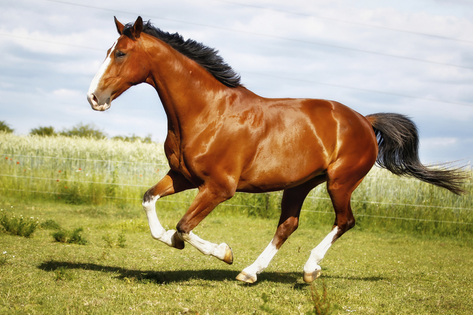
Are You & Your Horse Ready For Bitting Advice? The Steps You Need To Consider First
Equestrian Advice & Guides All Disciplines
Build your business profile for FREE and expose your services to thousands of potential clients!
Create my profile now!
Skin. We all have it, and chances are most of us take it for granted, but the skin is the largest organ on yours and your horse’s body. Its importance to your overall health is huge, and your horse is certainly no different.
Keeping skin in top condition isn’t just down to good grooming, it can be achieved by feeding the correct nutrients, vitamins and minerals too. Unfortunately the grass in your horse’s field is unlikely to contain everything needed to keep your horse’s skin strong and healthy, which is why more and more horse owners are now choosing to feed herbal supplements to keep their horse’s diets as natural as possible.
October to February is a time a lot of horse owners dread. Short days and long nights, wind and rain, cold fingers and toes, and not forgetting… MUD. Mud can wreak havoc with a horse’s skin and it can be incredibly hard to avoid. Comprehensive formulas that contain natural ingredients such as Turmeric can work to support skin condition and maintain a beautiful glossy coat.
Turmeric has become a bit of a wonder-herb in recent years, and it’s easy to see why. It’s economical, its anti-inflammatory type action helps to soothe delicate skin, and the majority of horses find it incredibly palatable. Add these benefits to the positive effects it can have on joints and you might think you have the perfect supplement for your horse. However, when blended with other natural ingredients it can tackle some of the most common equine skin concerns, such as mud fever and sweet itch.
As spring rolls around and temperatures start to rise, concerns of muddy fields are replaced with worries of flies and midges making an irritating return. Some horses find this time of year unbearable, with some even resorting to injuring themselves whilst trying to relieve severe skin itching and escape from the flies. Sweet Itch is unfortunately all too common in the warmer months, and many owners struggle to find ways to help their four-legged loved ones cope with sore and itchy skin. After spending a small fortune on various rugs and topical formulas, many horse owners are now discovering the more natural alternatives for supporting skin. As previously mentioned, turmeric is a key herb in the maintenance of delicate skin, alongside other natural ingredients such as Cedar tree extract.
Cedar tree extract has an oily consistency and an incredibly powerful smell and taste. Once digested, this strong scent is passed through the pores of the skin, putting off flies and midges that might be tempted to land on the body. Not only this, it has a soothing action on the skin itself, to help relieve itching and support overall skin condition. It’s also important to consider herbs that help to maintain a healthy digestive system, as research has shown that skin issues can often be linked to a horse’s digestion.
Not all equine skin problems are seasonal, some become long-term issues that are not only unsightly, but also cause discomfort. Sarcoids, for example, are still a bit of a mystery to horse owners and vets alike. They can appear and disappear within days, or they can become life-long blemishes with a hefty price tag. Among the many different approaches to tackling these lumps and bumps, herbal remedies are once again gaining popularity. Supplements with the highest rates of success concentrate on boosting and supporting the horse’s immune system with herbs like Guduchi Vine, Amla Berry or Winter Cherry, to give it the strength it needs to push the sarcoids from the inside out and ideally, drop off all together. The process is sometimes long and results vary from horse to horse, but on the whole, with a little patience, perseverance and commitment, herbal supplements could be the non-invasive answer many horse owners are looking for.
Herbs and natural ingredients have been used in the diets of humans and animals for centuries, but only in recent years have the benefits of traditional herbal practices regained their popularity for providing an alternative approach to various conditions. If you’re worried about your horse’s skin this year, consider introducing some humble herbs into his diet – you’ll be surprised how much difference they could make!
For more information on horses health and more guidance similar to this, feel free to visit our advice page.

